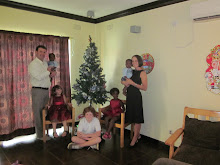I never take the time to blog.
When I
do, I often write most of a story, then stop, revise, edit, revise, and never actually
finish and post them.
I probably have 6
half-done blogs on the computer. So tonight, I will post whatever I write, and
not hem and haw over details until I have lost interest.
It will be an “off the cuff” post.
It occurs to me that my motivation for writing is usually an event that is
particularly overwhelming, and therefore usually negative, so the impression I
must give of myself is of a woman who lives very close to the edge and views
horrific tragedies daily.
I was, in fact,
fairly close to the proverbial edge last year, but I’m climbing down now.
This year, despite the profound anxiety I had
before our return this summer,
has been
significantly better than last year, for several reasons.
I think the key to “success” with five kids is
routine, and we have established one now that is comfortable and familiar.
This is not to say that I don’t have a
majority of days where I sit in shell-shocked silence and observe the din that
surrounds me: babies banging on metal pans with metal spoons, the wails of
injustice being perpetrated upon one of our children
by a parent or sibling, the relentless mantra
of motherhood in the background:”Mom?” Mom?” Mom?”all combining in a painful cacophony.
No, this is not Disney.
We have developed a fairly stable nanny/housekeeper
situation, and are learning to more effectively manage the madness required to
care for five children with two full-timeworking parents.
We have a nanny for the twins during the day
named Mary. She shows up at 6:30, when we are getting the children ready for
school, and takes care of the twins while we play the fun “hunt for the school
shoes” game and try to convince Aine she must eat something other than popcorn
for breakfast. Mary stays until 3.
Lucy, who cleans the house (thank God), works
from 10 am until 6 pm, although we are usually home by 5 or 5:30.
We have been teaching all of the nannies to cook “Azungu”
food, which consists so far of pasta sauce, mashed potatoes, and Aine’s staple,
“Mama Soup”.
Sometimes, if we plan ahead
and have been able to assemble all of the ingredients, she cooks dinner for us
before we get home, or shortly thereafter.
This area of our lives clearly has untapped potential, but it requires
somepre- planning to take the time to teach them to cook, and so we have not yet pursued
tit further.
Lucy and Mary work Monday
to Friday, and on Friday Martha comes.
She
now sleeps in a small room just outside the house, with a baby monitor, and
stays through Sunday evening.
This means
most nights Dave and I (well, let’s be honest, mostly Dave.) listen for
the babies ourselves now, with the exception of the weekends. Friday night is
always family night, which means we watch a movie and eat junk food. Saturday
is date night, and once a month Dave and I stay at a local hotel for a night.
My children seem happy, and adore each other (for the most part).
They seem to be thriving at school, and they
have a group of friends in our complex that they love and play with daily.
The twins are a toddling, drooling, biting,
grinning disaster.
They waddle through
the house and slide down the carpeted stairs at lightning speed, leaving a
trail of detritus and destruction in their paths.
They worship their older brother and
sisters.
I have never seen a big brother
who is better than Eamonn.
He picks the
babies up when they cry.
He holds them
up to the light switch and revels in their delight at the predictable magic
that is electricity.
He doesn’t want us
to put them to bed at night without him kissing them goodnight. He is like a
small adult; he sees and delights in the wonder of watching the babies
grow.
And as a bonus, he never has to
change their diapers or stay up at night with them.
Life in Malawi has gotten easier.
Petrol and diesel, although not ubiquitous, are much more available than
they were last year.
Plus, we have been
loaned another car, which has truly transformed our lives, and probably
drastically affected our fitness level.
The
cost of living continues to be outrageous, and it hasn’t gotten very hot yet,
but so far neither Dave nor I have had any kind of emotional outburst since we
returned.
We are much more Zen.
So if I have given the impression, through my blog posts, that life is
unbearable, or that I am depressed or on the verge of a nervous breakdown, I
apologize.
That's so Last Year. I am much happier here, now. My work is
fulfilling, and feels meaningful.
We spend
a lot of time together as a family, and our lives are much simpler.
I feel like I fit in here.
I like that the pace of life is slower in
Malaw i(except on the roads.
That drives
me crazy. People drive SO SLOWLY here, and it incenses the New-Yorker in me).
On that note, it is almost 8:45 pm, and therefore past my bedtime…
